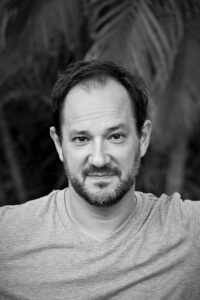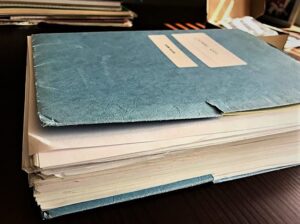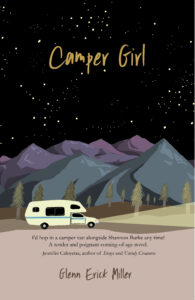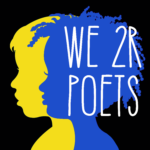Fitzroy Books staff were delighted to have a virtual sit down with Glenn Erick Miller, author of Camper Girl, and to share his responses with you!

Who or what inspired you? How so?
My father was an auto body repairman. He often worked 12 hour days, patching and painting all sorts of wrecks. It was hard, dirty, manual labor, and he loved it. Fixing cars was a kind of art form to him. He took great pride in it, and he was widely respected for his talents.
Seeing him take a busted-up car and give it new life taught my siblings and I how to approach any project with patience and dedication. He inspired us with his strong work ethic. We learned that if you really wanted to do something, you just do it. You will make mistakes, but you learn from them and move on. There was no time for self-pity or second-guessing; neither of those paid the bills.
Dad didn’t say all this; he was a quiet guy who taught by example, like the father in Robert Hayden’s Those Winter Sundays. When it came to work of any type, the important thing was not about being perfect or being the best. It wasn’t about seeking out thanks or admiration; the job itself, and the sacrifices you make along the way, were reward enough.
Writing a book, earning a degree, getting a good job—it’s all the same. If you work hard at something, and if you’re persistent and humble, good things will happen.
How long did it take you to write your book?
Camper Girl began as a project for Nanowrimo (National Novel Writing Month) way back in 2011. In one month, I wrote just over 50k words (the minimum to ‘win’ Nano). Over the next few years, I revised the manuscript, then started querying publishers and agents. I received some interest, but in the end, no deals.

I shelved the book and kept myself busy with other projects, publishing short stories and attending workshops and conferences.
In 2018, I sent the new and much improved Camper Girl back into the world of publishing. Regal House (through their YA imprint Fitzroy Books) offered me a contract, and I am so grateful to have the opportunity to partner with such a wonderfully supportive team.
Where do you get your information or ideas for your books?
I think the most important skill for any kind of creative pursuit is observation. You have to keep your eyes and mind open. Ideas and inspiration surround us every moment, and we have to be ready to accept them. That means being humble, patient, curious, and still. If we’re too noisy—too wrapped up in ourselves—we won’t hear inspiration when it comes knocking.

After relocating to Florida, I joined a fantastic writer’s group. I dusted off Camper Girl, shared it, and the group saw its promise. They encouraged me to make some big (and necessary) changes to the novel. I knew in my gut that Camper Girl was a story worth telling, so I pushed on.
Camper Girl grew out of a single moment. I was stopped at an intersection in the Adirondacks (in northern New York state) when I spotted a rusty old RV rumble past. Behind the wheel was a teenager, not who you’d normally expect to see driving that kind of vehicle, and I quickly imagined a backstory where the teen’s estranged, eccentric aunt had recently died and bequeathed her this old camper.
That “seed” rattled around in my head for months. I had a protagonist, and I knew I wanted her adventures to take place in the Adirondacks, but I had no clear vision of where to take the story. Still, I felt like there was a lot of promise there. Needing a kick start, I signed up for Nanowrimo. Before it began on November 1, I wrote down everything that could possibly go wrong. And for the next thirty days, the book’s plot took shape.
Everything I write seems to stem from a single image—a snapshot of something that is slightly amiss or out of the ordinary. If it lodges itself in my brain, then I know there’s something there worth exploring. But before you can tackle a big project like a novel, you have to first pay close attention to all those small moments.
What’s next for you?
I am working on Goon, a novel-in-verse about an adolescent group home in Florida. After college, I got a job at a similar facility, and I have worked with disadvantaged youth since. It is both extremely rewarding and extremely heartbreaking. As I research the current juvenile detention system, I am torn between wanting to tell these kids’ stories and wanting to adopt them all.
This is an emotionally draining project, but I’ve finally nailed down the right voice and the right format. It’s easy to get overwhelmed by the darkness of life’s hardships, so I’ve learned to view the book in the same way I have viewed my work in youth services. That is, in order to not get swallowed up by the dark, you have to recognize every little bit of light. You add all those bits of light together, and it’s easier to see a path forward. Humor, memory, imagination, and hope play such big roles in how kids overcome the darkness. This is something I’ve learned from them over the years, and now I’m trying to apply that to my writing practice. Yes, it’s a dark story, but in the midst of it all, there are many sources of light.
I am also compiling tons of ideas for sequels to Camper Girl. The working title of Part II in Shannon’s saga is Caravan. Her next journey will be longer, more arduous, and wilder (in good and not-so-good ways). It’s a cross-country trip that builds on the themes of home and homelessness, longing and be-longing. I don’t want to give away too much, but let’s just say that she might need to get a bigger camper.
Is there any reason grown-ups should or should not read YA books?
I’ve heard it said that people spend their entire adult lives trying to make sense of their teen years—both what they experienced and the choices they made. Adolescence is a time of monumental change. It shapes who we are as adults, and we carry vivid memories of our teen years through the rest of our lives.
Out of the blue, we cringe remembering something stupid we said way back in high school. Or our heart breaks a little every time we remember our first crush.
As teens, we distance ourselves from our families and seek out new groups to which we want to belong. We are inspired by a teacher or mentor who helps open our eyes to the possibilities of a particular career. We are hurt, and the pain reverberates ever after. We triumph, we fail, and we hopefully try again. We cheer and laugh and sob, sometimes all in the same day. All this occurs in just a few short years. It’s dynamic, exhilarating, and scary as hell.
It’s no wonder, then, that grown-ups are drawn to YA books. Whether we’re a few years out of high school or decades into adulthood, YA literature can bring us back to those moments—both wonderful and awful—which have provided our adult selves with a powerful sense of direction, identity, and purpose.

Glenn Erick Miller is the recipient of the 2017 Florida SCBWI Rising Kite Award, a first-place prize in the Adirondack Writing Center’s annual awards, and a Pushcart Prize nomination. His work has appeared in literary journals such as Citron Review, Agave Magazine, Heater, Fiction Fix, r.kv.r.y Quarterly, and Red Earth Review. His picture book, Red’s First Snow, was published in 2019.

